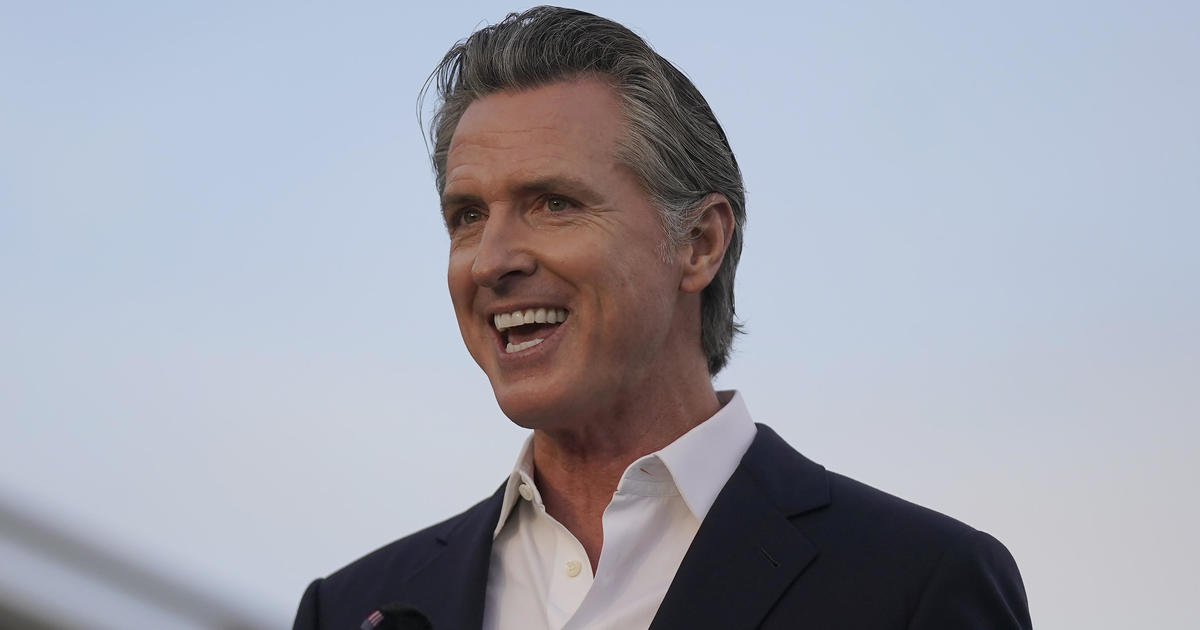Gov. Newsom Says Trump Unemployment Plan Falls Short, Addresses COVID-19 Data Glitch
SACRAMENTO (CBS SF) -- Gov. Gavin Newsom on Monday said President Trump's unemployment plan falls far short of what California needs in terms of funding and addressed the state's ongoing issues with COVID testing data for the first time.
"We analyzed the federal proposal that the President has put together and analyzed what the associated costs and expected benefits of advancing the program would be," Newsom said early in his Monday address. "Clearly, those executive orders do not meet the totality of need and totality of requests that governors of all political stripes, mayors, and the like, advocates and individuals expected of the federal government."
Newsom explained that Trump's new executive orders on unemployment rely on relief money already sent and mostly spent by California, falling far short of the state's needs.
The executive orders issued over the weekend came after the Trump administration and Democrats failed to come to a new deal to provide a second pandemic stimulus package for the nation last week.
Newsom said that the state would have to cover 25 percent of the costs associated with a $400 per week unemployment insurance payment outlined in President Trump's executive orders announced over the weekend.
That 25 percent would amount to the state spending between $700 million and $3 billion in taxpayer funds per week, Newsom said.
He also noted that 75 percent of existing CARES Act funding is already allocated for pandemic response, including the coverage of school, health and social programs.
The governor argued that it would be impossible for California to shoulder the financial burden outlined by the President's proposal without cutting importance services and passing some of that burden on to businesses and individuals.
"The state does not have an identified resource of $700 million per week that we haven't already obliged. There is no money sitting in the piggy bank of the previous CARES Act to be re-prioritized or reconstituted for this purpose. Simply does not exist," explained Newsom. "And for the state to absorb $700 million per week, potentially close to $3 billion per week - when, not if, the identified $70 billion fund the President is looking to draw down from - would create a burden the likes which even a state as large as California can never absorb without, again, massive cuts to important services."
The governor said that the new federal proposal outlined in the executive orders presents an entirely new program that will leave out those with the greatest need and delay unemployment insurance checks from being issued. The proposed program requires certification of work lost due to COVID-19 and would demand that California completely revamp its current system.
Newsom said that the current levels of unemployment and under-employment are at heights not seen since the Great Depression and even higher than the numbers recorded nationally, requiring that the state get federal help to cover unemployment insurance.
"Enormous economic strife and enormous economic stress. The historic amount of unemployment insurance that we have been providing, we need the federal government to front those dollars. We simply do not have the capacity, again, even a state as large and as well resourced and as well managed in terms of our reserve and our capacity to borrow [as California. We simply are not in that position," said Newsom.
The governor also addressed concerns that residents might have regarding eviction moratoriums instituted during the pandemic that will soon be expiring.
One of the executive orders Trump signed targets evictions, but does little to keep renters and mortgage-payers in their homes. Rather, the order encourages federal agencies to use the powers they already have to "consider" policies that would prevent evictions.
Newsom said the state's ongoing actions to halt evictions have come while the federal government has provided little in terms of addressing the issue of evictions and failed to compromise with Democrats in Congress.
"Remember though, Speaker Pelosi led with strategies to address this months ago. Unfortunately, we were all put as American citizens in this position because of the inability to formulate a compromise last week," said Newsom. I appreciate there was some extension of consideration to this by the President, but it was more along the lines of studying this issue, providing some capacity at HUD and elsewhere to move on this, but we need something much more specific, much more directed, and we, again, are working overtime to advance just that."
Newsom said a full three-quarters of the state's tenants who have fallen behind on their rent payments are Black or Latino.
Newsom did note that fortunately, over 50 percent of the state's residents live in areas that have eviction moratoria already in place, with 80 cities and 10 counties in California taking such preventive steps.
The state's own eviction moratorium runs out as soon as Friday. Newsom said state legislators and his office are collaborating on a solution to extend those eviction protections deeper into the year.
"We have every hope and expectation that we will organize a collaborative framework" to prevent evictions at least through the end of August, Newsom said.
The extension would give the Legislature the chance to codify an eviction moratorium before its session ends at the end of the month.
Newsom was speaking about the state's response to the pandemic for the first time in seven days after a tumultuous week that found California health officials grappling with COVID-19 data issues. On Sunday, California Public Health Director Dr. Sonia Angell announced her resignation from her post.
Despite those issues, the governor did not address the state's problems with data until well into his briefing, finally admitting that health officials "have had a little bit of trouble" with the state's testing data.
The governor appeared to blame data issue on the state's extended neglect of "large scale IT issues" that were "decades and decades old," but insisted that his administration was focusing on the problem.
Newsom said that last week the state was able to clear the backlog of nearly 300,000 test reports that were delayed due to the data issues and insisted he was "absolutely confident" that the latest figure of 7,751 new coronavirus cases in the past 24 hours was accurate.
Newsom did not address the departure of Dr. Angell during his initial comments Monday, though Health and Human Services Secretary Dr. Mark Ghaly thanked Angell for her contributions during Monday's update.
"To her, I'm grateful for her service," Ghaly said.
When Newsom began answering questions from reporters, he insisted that he did not know about the data glitch until Monday night, after he had last addressed the public about the pandemic. He noted that Dr. Ghaly spoke about the data issues in his address the following day.
When pressed by reporters, Newsom refused to say whether he asked for Dr. Angell's resignation or if she resigned on her own, and whether her stepping down had to do with the data glitch issue.
"I try not to have personnel conversations in public. I don't know that it serves a larger good. At the end of the day, the buck stops with me. I'm accountable and I recognize that as governor of the State of California," said Newsom. "As it relates to my responsibility, it extends to my team and it extends to our efforts to keep you safe, to keep you healthy, and to mitigate the spread of this disease. I want to thank Dr. Angell for her leadership, her stewardship, and you know, it is one of those difficult things when someone leaves that you consider a friend, someone I respect, someone who was a real champion for racial justice, for social justice, it's the reason she was brought into the administration. The decision's made, we're moving on."



